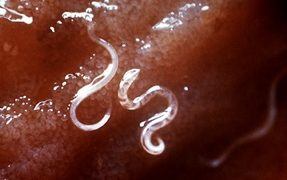“This post contains affiliate links, and I will be compensated if you make a purchase after clicking on my links.”
A lot of dog owners think that if their dog’s stool is normal, then they don’t have worms. This is not always the case. For starters, it is actually very rare for one to spot worms in a dog’s feces without a microscope. The worms typically remain living in your dog’s intestinal tract and what is found in poop is usually eggs or pieces of worm that have broken off. Dogs that are suffering from these parasites don’t always have diarrhea or a loose stools. It is important to understand that stool appearance or consistency doesn’t necessarily indicate the animal has worms.
Most Common Types of Intestinal Dog Worms
1. Roundworms or Nematodes. In an adult, the worm appears like a piece of spaghetti. This parasite is commonly spread from one dog to another by the ingestion of feces, or from a pregnant mother dog through her placenta to the pup, thus, infecting them. Roundworms can survive in dogs (and humans!) for many years, consuming partially digested food. Serious roundworm infection can cause death, but the most common side effects are weight loss, decreased appetite, vomiting, diarrhea, a pot-bellied appearance in puppies, and a weak appearance in adult dogs.
2. Hookworms. These worms are usually transmitted through four different sources: orally, through the skin, through the mother’s placenta before birth, and through the mother’s milk. The side effects of a hookworm infestation include intestinal distress, weight loss, bloody diarrhea, failure to grow properly for puppies, and anemia. Skin irritation can often indicate a hookworm infection, as they cause a great deal of discomfort in dogs. It has been reported that hookworms can lay up to 20,000 eggs per day! Plus, in puppies, the infestation must be quite severe before the worms are present in fecal examinations. So, watching for the signs and having your puppy tested and de-wormed is of the utmost importance. Many vets will de-worm a puppy even without evidence just to be on the safe side.
3. Whipworms. These worms are also typically spread through the ingestion of feces. It usually affects both adult dogs and puppies. This parasite can result in severe health issues for your pup. The worms stick to the animal’s colon and intestinal lining and thrive on the dog’s blood. As the parasites multiply in the host’s intestine, they eventually deplete its blood supply thereby causing anemia. In puppies, this condition can be fatal. Severe and ongoing diarrhea is a strong indicator of whipworm infection. Additionally, these worms’ eggs are resistant to drying and heat and can therefor live in your dogs’ passed stool for as long as it is around. Whipworms are an excellent reason to pick up after your dog, as he can easily become reinfested by coming in contact.
4. Tapeworms or Cestodes. Unlike most other dog worm types, these parasites are not passed on via feces. Instead, it is transmitted by ingesting a flea that carries the immature worm. As these parasites grow in the animal intestine, segments break off. The infection, unfortunately, causes no apparent symptoms. Often, it goes undetected till the dog owner finally notices those small, dried up worm segments that migrate out of the pet’s rectum. These bits usually get caught in the dog’s fur that surrounds its anus or on the outside part of fresh stool, with the appearance of a grain of rice crawling on its surface. While they are not always very harmful, severe infestation can cause weight loss or debilitation. If you see your dog scooting his hind end across the carpet often, you might want to check for itchy tapeworms! The absolute best prevention for tapeworm is preventing fleas from living on your dog or in your home.
Warning Signs
Most, if not all, dogs with worms suffer from conditions associated with mild malnutrition or abnormal absorption of nutrients. This commonly results in weight loss even when the dog seems to be eating normally. The loss of nutrients causes the loss of quality in the animal’s coat; making it seem dull or unkempt. More often than not, dogs with worms are diagnosed by a vet after their feces have been studied under a microscope.
Treatment
To treat intestinal parasites, a broad-spectrum de-wormer is commonly used. This usually consists of fenbendazole along with praziquantel if tapeworms have also been found out to be present. If your pet frequently appears to be having worm problems, giving them natural dietary supplements could be helpful. Also note, because worms can be more harmful, even lethal, in new puppies, it’s important that you or your vet de-worm your puppy as soon as he is weened or as soon as you adopt him. Even if your puppy has no worms, a de-wormer will not harm him.

















What Karate Should I Take
Jan 18, 2014 at 11:43 am
These Masters taught their sons and those sons taught their
sons. As adults, we know that the diplomatic approach
to a . Not surprisingly it acquired many rewards at the Hong Kong motion picture awards.